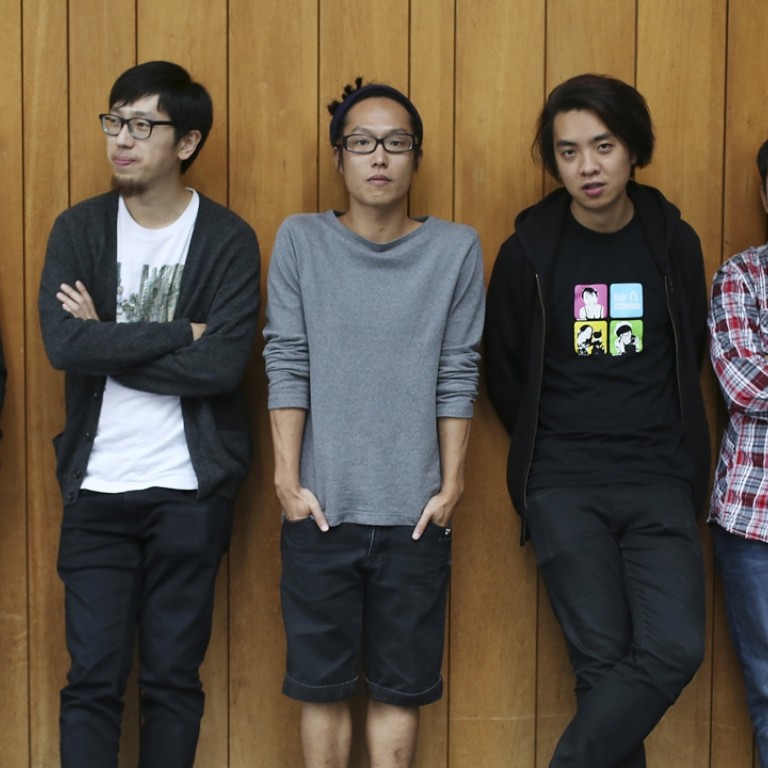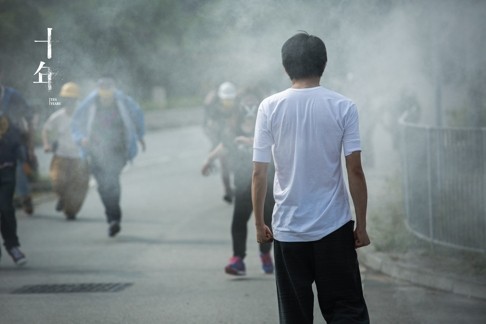
Ten Years: Hong Kong film that beat Star Wars at the box office, and the directors behind it
Dark, political satire set in Hong Kong 2025 performed better than global mega hit The Force Awakens at one city cinema. We asked the people who directed some of its five episodes what inspired them
At Broadway Cinematheque in Yau Ma Tei, a local low-budget film outperformed the latest Star Wars release at the box office. Ten Years, consisting of five short films with heavy socio-political undertones, has become an unexpected hit for its daring portrayal of Hongkongers’ worries over mainland influence.
As the name suggests, Ten Years posits what Hong Kong will be like 10 years from now.
Hongkongers’ fear of and alienation from the motherland are on full display throughout the film.
Film review: Ten Years – Hongkongers’ worst post-Occupy fears depicted in 5 short films
Hong Kong in 2025 is afflicted with “youth guards” vandalising neighbourhood stores and triad-like officials cooking up an assassination plot to sow public panic to facilitate the passing of a national security law. Locals who do not speak Putonghua are marginalised.

The death of a young hunger striker protesting for independence prompts a sympathetic old woman to set herself on fire in the first self-immolation incident in the city.
While the plot might seem far-fetched, Chow Kwun-wai, director of Self-immolator, says recent incidents involving brutal treatment of protesters by police would also look unbelievable and ridiculous 10 years ago.
SEE ALSO: The 25 best films of 2015: Star Wars, Mad Max, The Assassin and more
“In 2004, people would also find it hard to believe that [the police can drag a protester into a dark corner and beat him up],” he says. “When a frog feels the heat and wants to jump out of the pan, it is already too late. Portraying scenes of self-immolation in the thick of protests for independence is like pouring a basin of hot water over the audience’s heads.”
The idea of Ten Years is the brainchild of Ng Ka-leung, a design graduate from Polytechnic University who works in film post-production. While it is easy to associate the movie with the “umbrella movement”, Ng stresses that he had the idea way before the protests started.

Jevons Au Man-kit, the scriptwriter and director of Dialect, which portrays how Putonghua is marginalising Cantonese, says he based the plot on personal experience.
“When I first worked as a scriptwriter in 2004 after graduating in movie directing from the APA, I used Cantonese to write dialogue. But later, when I work on mainland-Hong Kong joint productions such as Don’t Go Breaking My Heart, more and more Putonghua crept into the script. I am like the taxi driver in the film who fails to learn Putonghua no matter how hard he tries. I need to call my mainland friends to ask them how Cantonese sayings are said in Putonghua. I have doubts about my worth and worry that my livelihood could be affected in the future.”
In Dialect, taxi drivers who have not passed the Putonghua test are forbidden to work in certain busy districts in Hong Kong, a plot that Au says is based on real events in Wuhan.
“Wuhan officials introduced the policy in order to reduce conflicts between Wuhan taxi drivers and tourists. In 2003, the Transport Department in Hong Kong had a similar proposal. But it didn’t come to fruition in the end.”
In Dialect, Putonghua not only creeps into the workplace, it also encroaches upon the household. The scene of the taxi driver at a loss over phrases his son uses will certainly strike a chord with older Hongkongers who did not have the chance to learn Putonghua at school.

Kwok Zune, director of Extras and graduate from APA in film directing, says the triad-like officials in his portentous parable about political assassination share traits with the pro-establishment groups.
“Those groups receive political orders from above. An intimating presence due to their sheer numbers, they browbeat and beat up protestors from rival groups. That’s not much different from triads.”
Although a gloomy movie with heavy political messages, Ten Years ends on a positive note, with the last scene reminding the audience that it is never too late.
Chow Kwun-wai, whose son was born last year when the Occupy Central protests broke out, says he wants his son to grow up in a city that is free of social injustice and political coercion.
“When I grew up, things were constantly changing for the better. Now in my son’s generation, the situation is the opposite. I hope our film can lead to an awakening among the masses and inspire them to think about issues and care more about Hong Kong.”
From the viral discussions the film has triggered in online forums, it seems the young directors have achieved their mission. Ng Ka-leung says they are surprised by the film’s overwhelming response.
“When we made the movie, we never thought about the box office as market demand was never our concern. Though we had sponsors, we had to shell out our own money. That the film is seen by so many people means that independent movies can also be [commercially] possible. We want to make more film projects in future.”
Ten Years is now showing at Broadway Cinematheque

